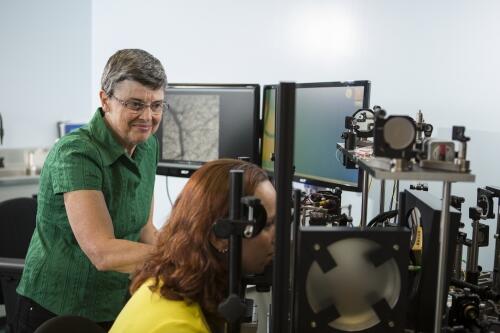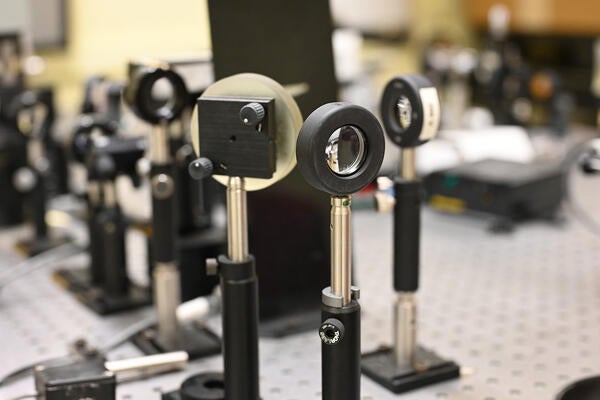WATERLOO, Ont. (Tuesday, Sept. 25, 2012) – A University of Waterloo professor leads a team of researchers that has developed a new method of detecting Alzheimer's disease by looking into the eye. The discovery may lead to earlier, better and less expensive treatment for patients, and it was recognized with a significant government grant announced today.
Professor Melanie Campbell of the Department of Physics and Astronomy as well as the School of Optometry and Vision Science at Waterloo received a grant worth $490,000 from the Canada Institutes of Health Research (CIHR) and the Natural Sciences and Engineering Research Council of Canada (NSERC). The grant will support Campbell's work into detecting amyloid beta in the neural tissue of the retina at the rear of the eye. Amyloid beta, a protein, forms deposits in the brain in the early stages of Alzheimer's disease.
"Millions of people around the world suffer from Alzheimer's disease, and I am pleased that Professor Campbell and the other researchers are working on an early detection mechanism that may benefit the world's aging population and eliminate the need for more expensive testing," said Feridun Hamdullahpur, president & vice-chancellor of Waterloo. "Health and aging is one of the key research areas at Waterloo, and I congratulate the whole the team on this deserved recognition."
Approximately one in every 17 people over the age of 65 in Canada has Alzheimer's disease. Within the next 30 years, the rate is expected to quadruple. Diagnostic guidelines suggest that a definite diagnosis is only possible after the patient dies. But this new method would enable detection earlier, using techniques that are more accessible to patients and less expensive than brain imaging.
"Current methods under study for objectively diagnosing Alzheimer's disease require invasive testing, the use of radiation or fluorescent dyes," said Campbell. "Using non-invasive methods, we will explore any association between the amount and distribution of amyloid beta in the retina and in the brain."

This research is in tandem with work taking place at the University of British Columbia, the local technology company P & P Optica, and TRIUMF, Canada's national laboratory for particle and nuclear physics that a consortium of Canadian universities jointly owns and operates. This project will help researchers understand the relationship between these amyloid beta deposits in the eye and the severity of the disease. Findings may lead to the development of a new instrument that will be available in optometrists' offices and other health-care settings.









